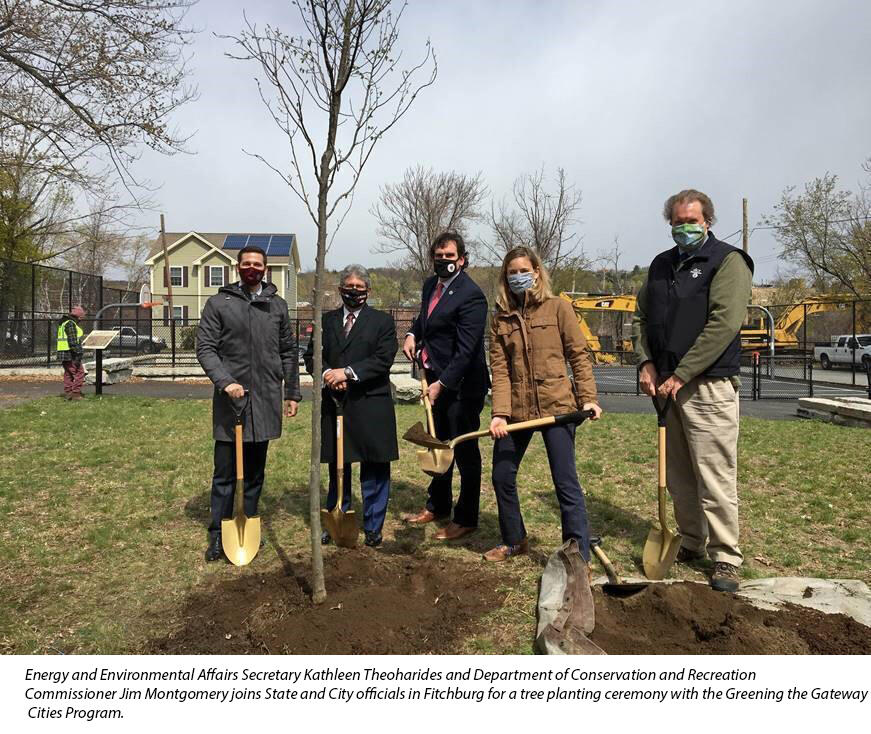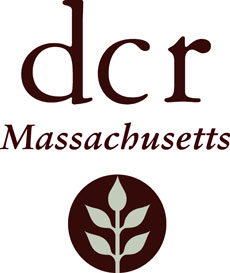- Department of Conservation & Recreation
Media Contact
Olivia Dorrance, Press Secretary

BOSTON — As part of its celebration of Earth Week in the Commonwealth, Energy and Environmental Affairs (EEA) Secretary Kathleen Theoharides and Department of Conservation and Recreation (DCR) Commissioner Jim Montgomery today planted a tree in DeCaria Park in the City of Fitchburg through the agency’s Greening the Gateway Cities Program (GGCP). The program provides trees free of charge to qualifying residents in an effort to reduce energy use in urban neighborhoods by lowering heating and cooling costs.
“The Baker-Polito Administration remains committed to improving green infrastructure, such as urban tree canopies, in an effort to combat climate change and its impacts to vulnerable neighborhoods,” said EEA Secretary Kathleen Theoharides. “By increasing a neighborhood’s tree canopy, the Greening the Gateway Cities Program improves air quality, reduces energy consumption, expands vital habitat, and beautifies the area.”
Since 2014, more than 28,500 trees have been planted by the GGCP in several Gateway Cities across Massachusetts. The program specifically targets areas with less tree canopy, older housing stock, higher wind speeds, and larger renter populations. In addition, plantings are concentrated in Environmental Justice neighborhoods to benefit those most in need. Trees near homes and buildings shade structures and lower surface temperatures, while trees up to 1,500 feet away from a home also provide important benefits to the community (cleaner air, increase in property values, reduction in noise pollution, and improved public health). Additionally, in the winter months, tree trunks and branches help to randomize wind patterns and decrease heat loss by air infiltration in poorly insulated homes. Furthermore, GGCP tree plantings benefit the local economy through the purchasing of trees at local nurseries and employing local planting crews.
"The Department of Conservation and Recreation is proud to join with local partners working closely with the agency to achieve success through initiatives like the Greening the Gateway Cities Program,” said DCR Commissioner Jim Montgomery. “Planting trees in Environmental Justice communities is just one of the many ways the Baker-Polito Administration is able to create community bonds, provide tremendous energy benefits, and further enhance neighborhoods.”
In fall 2020, DCR expanded the GGCP from 14 communities to 18 communities, welcoming Fitchburg, Lowell, Salem and Westfield. Other communities currently active with the program are Brockton, Chelsea, Chicopee, Fall River, Haverhill Holyoke, Lawrence, Leominster, Lynn, New Bedford, Pittsfield, Quincy, Revere, and Springfield.
“We are thankful to the Baker-Polito Administration for expanding this program. The Greening the Gateway Cities Program will not only assist us as we revitalize our City, but helps us do so in a green and environmentally friendly way,” said Mayor Stephen L. DiNatale of Fitchburg, Massachusetts. “Most importantly though, it helps our citizens with their heating and cooling costs while providing canopy cover.”
“These investments make our communities sustainable and a healthier place to live. By Greening the Gateway Cities, we both beautify our hometowns and make them a more attractive place to live, work, and enjoy life.” said State Senator John Cronin (D- Lunenburg)
“There’s no more fitting time to recognize the importance of the environment around us than Earth Day. I’m pleased today to join with Secretary Theoharides and my fellow state and municipal officials to commit ourselves to increasing the tree canopy in our urban and Environmental Justice neighborhoods across Fitchburg and the Gateway Cities across the Commonwealth.” said State Representative Michael Kushmerek (D-Fitchburg).
To be eligible, residents and property owners must agree to a two-year watering commitment to ensure the trees’ survival. Easy care instructions are provided by DCR to tree recipients addressing watering, mulching and pruning. When a potential tree recipient registers, a DCR urban forester will visit their home to determine the best location and species of tree for energy efficiency. They also conduct year-round site visits and are available to answer questions. To find out if a home or business is within the planting zone, and to order a free tree, property owners and residents should visit MAUrbanCanopy.org. For more information, please visit the program’s webpage.
During this year’s Earth Week in Massachusetts, the Baker-Polito Administration is highlighting its commitment to supporting the Commonwealth’s Environmental Justice communities, and ensuring that all residents are protected from environmental pollution can enjoy a clean and healthy environment. During Earth Week, the Administration is holding events throughout the Commonwealth spotlighting important initiatives, including the expansion of tree planting through the Greening the Gateway Cities Program, increasing access to healthy, nutritious food by supporting urban farms, and ensuring clean water by providing grant funding to local municipalities.
On March 26, 2021, Governor Baker signed comprehensive climate change legislation;that includes nation-leading provisions related to Environmental Justice. Recognizing the significant impact of climate change on Environmental Justice communities overburdened by poor air quality and disproportionately high levels of pollution, the legislation statutorily defines Environmental Justice and environmental burdens, including climate change as an environmental burden. The legislation also expands Massachusetts Environmental Policy Act (MEPA) review to require an Environmental Impact Report for all projects that impact air quality within one mile of an Environmental Justice Neighborhood, and requires the Department of Environmental Protection to conduct a stakeholder process to develop a cumulative impact analysis as a condition of permitting certain projects. This change would, for the first time, require the agency to evaluate not just individual project impacts but also historic environmental pollution throughout the community through the permit process.
###
